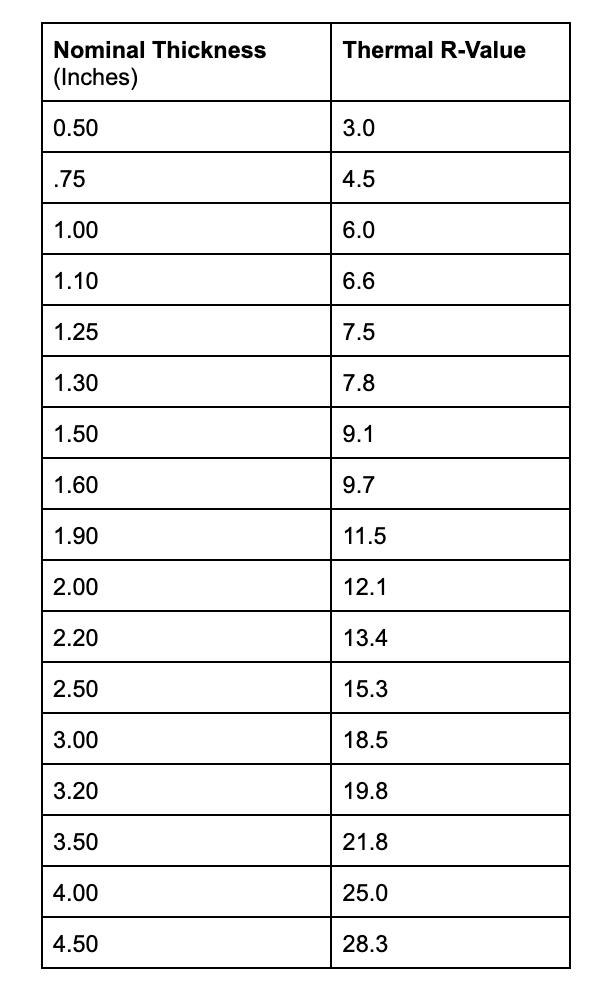Insulation code requirements are constantly changing, with new updates coming every couple of years from organizations like the International Code Council (ICC).
Meet Building Code R Values
Staying up to code ensures that your building is not only compliant with local ordinances, but also energy efficient. In the long run, meeting or exceeding energy code requirements can add up to significant savings for the building owner.
Building codes, like the International Energy Conservation Code (IECC), use thermal resistance values (R-value) to communicate insulation performance requirements. Since R-values are cumulative, a higher R value per inch of rigid insulation will allow you to get the best performance with a thinner profile.
Let’s lay out your options to achieve the best rigid insulation R value per inch.
Rigid Insulation Types
Rigid insulation is insulation that comes in the form of standalone rectangular boards. The raw materials can be foam-based or even made from mineral wool. Rigid insulation boards come in various thicknesses, ranging from ¼” up to 6” thick. Examples of rigid insulation include:
EPS: Expanded Polystyrene
XPS: Extruded Polystyrene
Polyisocyanurate: Polyiso
Mineral Wool Board
All of these rigid insulation types are available in 4-by-8-foot boards and similar sizes. And they’re all installed by butting the edges up to each other, resulting in continuous insulation over building surfaces like walls, slabs, and roofs.
Rigid Insulation Vs. Other Types of Insulation
Rigid insulation is different from other common building materials like fiberglass, cellulose, foam spray, and mineral wool batts. These other materials are less dense, more flexible, installed differently, and have different insulating properties. Many of these other types of insulation cannot be installed continuously (except spray foam if installed properly) and most of them require special equipment and expert installation.
R-Value of Rigid Insulation & Other Types
Let’s compare the R value of rigid insulation to these other types of insulation in the table below. You’ll notice that we call out the R-value per inch. This is because rigid insulation allows stacking of boards to achieve a desired R-value.
The R value rigid insulation numbers show that rigid insulation performs better than other insulation types in most cases. Polyiso is the top rigid insulation performer at R-6 per inch and closed-cell spray foam is the top performer for non-rigid insulation at R-7 per inch.
Example of How to Meet R-Value with Rigid Insulation
In real-world applications, R-value numbers tell you how thick, or how many layers, you need to install your insulation to achieve the proper rigid foam insulation R value required by code.
Let’s say you’re installing polyiso on your walls and R-20 continuous insulation is required by code. Since rigid insulation R values are cumulative, you can take the code requirement of R-20 and divide it by the R value per inch of each rigid insulation type.
Rock Wool: R20/R4.2 = Requires at least 4.8” Thickness
EPS: R20/R4.2 = Requires at least 4.8” Thickness
XPS: R20/R5.0 = Requires at least 4” Thickness
Polyiso: R20/R6.0 = Requires at least 3.4” Thickness
Always verify the R value of the desired thickness with the product data sheet to confirm that these values are accurate. In the table below, we show how the R-values of Rmax Durasheath® building envelope insulation are displayed on the product data sheet.
While R-values address thermal resistance, sound insulation is often considered separately. For quick estimates of how a wall or floor assembly might reduce noise, you can turn to an STC calculator.
The R-value of polyiso at 1” is exactly R-6.0, so you would expect the R-value at 2” to be R-12.0. Per this table, it’s just a tad higher at R-12.1 for 2” thick polyiso insulation. Once again—you would expect the R-value of 18 for 3” thickness, but the actual R value for rigid insulation is R-18.5 for 3” thick polyiso boards.
Another thing you may notice from the table above is that polyiso is available in very precise thicknesses and can be customized to fit your project needs.
Pick the Right Rigid Insulation with Rmax
If you’re ready to specify rigid insulation for your project and you want to maximize your R-value per inch, polyiso provides the best rigid insulation R value per inch. Now, you just need to decide which facer material will complement your building’s design the best. Get help today picking the right product from the experts at Rmax.



